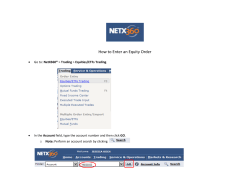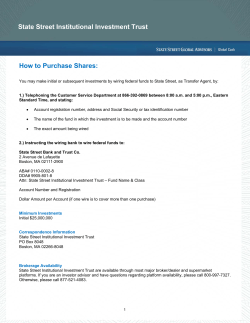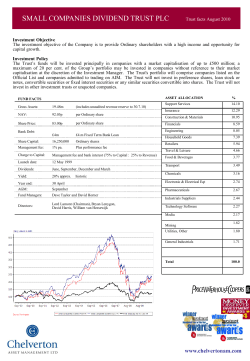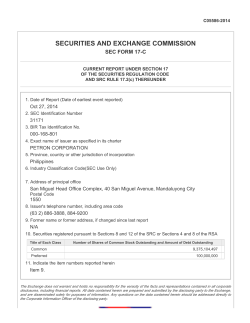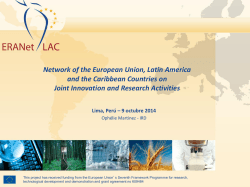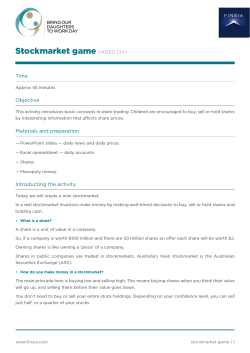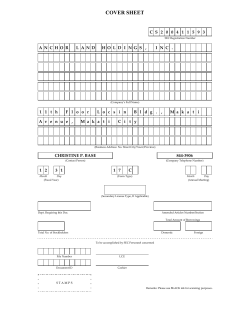
Hong Kong Tax alert Tax deductions for share-based payments further clarified
3 November 2014 2014 Issue No. 20 Hong Kong Tax alert Tax deductions for share-based payments further clarified This tax alert discusses the clarifications provided by the Inland Revenue Department (IRD) in its 2014 annual meeting with the Hong Kong Institute of Certified Public Accountants (HKICPA) as regards the deductibility of share-based payments in certain circumstances. The issues clarified are summarized in the answers to the three questions posed below. While not considering that there is an imminent need to issue a Departmental Interpretation and Practice Note on the captioned subject, the IRD undertook in the meeting that it would continue to disseminate its views on the subject through the FAQs or Tax Representatives’ Corner portions of its website. Determining the tax deduction for share-based payments could in many instances be a complicated matter. Clients should seek professional tax advice where necessary. 1. Is tax deduction for a share-based payment necessarily restricted to the lower of the amount recharged or the market value of the shares on the date of vesting? Position taken by the IRD Company B can only claim a tax deduction in Year 4 when shares vest This was in fact a follow-up question posed by the HKICPA given the uncertain effect of the replies provided by the IRD on the same issue in their 2013 annual meeting. Scenario posed by the HKICPA Under a group employee share-based incentive scheme, Company A, as parent, grants some employees of its subsidiary, Company B, share awards at a nominal consideration. The employees of Company B will receive the share awards at the end of their third year of employment, provided the employees have remained with Company B for the 3-year vesting period. To discharge its obligations under the group scheme, Company A acquires its own shares from the market (as treasury stock) in Year 1, incurring actual costs of HK$2 million. Furthermore, from the outset of the group scheme, pursuant to a recharge agreement, Company B agrees to pay Company A the fair value of the share awards involved at the end of each year of the 3-year vesting period. The shares involved on date of grant are valued at HK$1.8 million. Therefore, under the recharge agreement, Company B is liable to pay Company A HK$600,000 at the end of each of the three years concerned, assuming, for the sake of simplicity, the costs are evenly recharged over the three years. Assume now that the employees of Company B obtain, in Year 4, all the share awards previously granted to them and that the market value of the shares involved on the date of vesting is HK$1.5 million. The table below summarizes the relevant figures: HK$ Actual costs incurred by Company A for acquiring its own shares from the market in Year 1 2.0 million Total amount recharged by Company A to Company B (i.e., a recharge of $600,000 payable for each year at the end of Year 1, Year 2 and Year 3) 1.8 million Market value of shares involved on the date of the vesting to the employees in Year 4 1.5 million Despite the group arrangement that Company B is liable to pay Company A HK$600,000 at the end of each of the 3-year vesting period under the recharge agreement, the IRD took the view that Company B would only have a definite liability to pay Company A at the end of the vesting period when the shares vest to the employees in Year 4. As such, the IRD considered that Company B would not be eligible for a tax deduction of HK$600,000 in each of the 3-year vesting period. Instead, Company B would only be entitled to a tax deduction in Year 4 when the shares vest to the employees. Amount Company B can claim as deductible in Year 4 when shares vest The IRD indicated in the 2013 annual meeting that the amount that Company B can claim as deductible in Year 4 may not be HK$1.8 million, i.e., the total amount Company B is liable to pay Company A in accordance with the recharge agreement. Instead, the amount that can be claimed for a tax deduction may have to be restricted to HK$1.5 million, i.e., the market value of the shares on the date of vesting. The IRD stated that Company B could have acquired the shares from the open market at a cheaper cost of HK$1.5 million in discharging its obligation towards the employees. To safeguard Company B’s interest, it was expected that the terms of a commercial realistic recharge agreement would allow for an adjustment of the amount of recharge having regard to the market circumstances. The payment of the recharge of HK$1.8 million by Company B without regard to market circumstances might indicate a claim for an excessive deduction. Position clarified by IRD in 2014 annual meeting In the 2014 annual meeting, the IRD clarified that the absence of an adjustment clause in a recharge agreement did not necessarily mean that the recharge agreement was commercially unrealistic. This clarification was made in response to the HKICPA’s argument that parties to a contract were free to agree on the terms of the contract. Therefore, so long as the terms struck were arm’s-length, the amount so agreed should be tax deductible, regardless of whether there was an adjustment clause in a recharge agreement. Nonetheless, the IRD remarked that whilst the excess (i.e., a recharge above market price) arising from the normal fluctuation of a share price might generally be accepted, the IRD would reject cases where the recharge was blatantly above what would be reasonable and commercial for acquiring the shares in the open market. Hong Kong Tax Alert 2 2. Would share-based payments be disallowed twice during vesting period if they are passed on to another entity? The following diagram illustrates the question raised by the HKICPA. Holding Co. Granted share awards with a 3year vesting period (relevant costs recharged to Employing Co.) Provision of services Operating Co. Employing Co. Service fees (including a dollar-fordollar recharge of the share-based costs incurred by Employing Co.) Senior employees Employing Co. Profit and loss account in Year 1 Operating Co. Profit and loss account in Year 1 HK$ HK$ Service income 100 Turnover xxxx Share-based cost, say 100 Service fee paid 100 Tax treatment Employing Co. Operating Co. Each of Year 1, Year 2 and Year 3, during the vesting period Disallow HK$100 Also disallow HK$100 (as the service fee paid also represents the underlying share-based cost)? Year 4 – when shares vest Claim a total deduction of HK$300 disallowed during the vesting period) Also claim a total deduction of HK$300 disallowed during the vesting period? Hong Kong Tax Alert 3 In the above scenario, the group may for various commercial reasons, centralize the employment of certain senior employees in a group employing company. These senior employees would however render services to other group operating companies. Under such an arrangement, a group employing company would charge an operating company service fees for its provision of employees, say on a cost recovery basis. In reply, the IRD stated that where the shares so acquired by the company were not required to be cancelled under the company law of the jurisdiction concerned (e.g., in the US where the shares so acquired could be treated as treasury stock), the out-of-pocket costs so incurred would be allowed as a tax deduction in Hong Kong, provided that the relevant costs related to the generation of that company’s chargeable income in Hong Kong. The question was whether in line with the IRD’s position discussed above, both the employing company and operating company would have to disallow the share-based cost of HK$100 in each year of the 3-year vesting period, and only be able to obtain a tax deduction of HK$300 in Year 4 when the shares vest. The IRD however noted that where the company was a Hong Kong incorporated company, the shares it bought back would be treated as cancelled under the Companies Ordinance. Under such circumstance, as the shares bought back would be cancelled, the subsequent issue to its employees in accordance with a share-based scheme would be treated as a new issue of shares. As such, the aforesaid UK case-law authority would apply to deny the tax deduction. This was because any costs recognized in the accounts for such a share-based payment would be regarded as being “notional” and not an actual “outgoing” or “expense” incurred with a view to generating assessable profits as required under section 16(1) of the Inland Revenue Ordinance. In reply, the IRD stated that the disallowance of the sharebased cost during the vesting period would only apply to the employing company, but not to the operating company. In other words, the operating company would be able to claim a deduction of HK$100 in each year of the 3-year vesting period for the service fee paid to the employing company, even though it represented a recharge of the share-based cost incurred by the employing company. 3. Are actual out-of-pocket costs incurred by a company in acquiring its own shares from the market to operate a share-based scheme for its own employees tax deductible? The background to this question is the IRD’s stated position (based on the authority of the 1940 UK case Lowry v Consolidated African Selection Trust Ltd 23 TC 259) that the notional cost of a company issuing its own new shares at below market value in order to operate a share-based scheme is not tax deductible. The HKICPA’s question was: what if in order to operate a share-based scheme, a company did not issue its own new shares, but acquired the shares involved from the market as treasury stock, thereby incurring actual out-of-pocket costs. In that situation, would the UK case-law authority then be inapplicable, and the outof-pocket costs so incurred tax deductible? Hong Kong Tax Alert 4 Financial Services Hong Kong office Rowan Macdonald Managing Partner, Tax, Asia-Pacific +852 2629 3088 rowan.macdonald@hk.ey.com Principal tax contact Florence Chan Partner +852 2849 9228 florence.chan@hk.ey.com Business Tax Services International Tax Services Paul Ho Partner +852 2849 9564 paul.ho@hk.ey.com James Badenach Partner +852 2629 3988 james.badenach@hk.ey.com Napson Hon Director +852 2849 9163 napson.hon@hk.ey.com John Praides Partner +852 2629 3269 john.praides@hk.ey.com Sunny Liu Director +852 2846 9883 sunny.liu@hk.ey.com Carine Sabot Partner +852 2849 9510 carine.sabot@hk.ey.com Michael Stenske Director +852 2846 9865 michael.stenske@hk.ey.com Michelle Yan Director +852 2629 3843 michelle.yan@hk.ey.com Peggy Lok Director +852 2629 3866 peggy.lok@hk.ey.com Transfer Pricing Services Justin Kyte Partner +852 2629 3880 justin.kyte@hk.ey.com Jonathan Thompson Partner +852 2629 3879 jonathan.thompson@hk.ey.com EY | Assurance | Tax | Transactions | Advisory About EY EY is a global leader in assurance, tax, transaction and advisory services. The insights and quality services we deliver help build trust and confidence in the capital markets and in economies the world over. We develop outstanding leaders who team to deliver on our promises to all of our stakeholders. In so doing, we play a critical role in building a better working world for our people, for our clients and for our communities. EY refers to the global organization, and may refer to one or more, of the member firms of Ernst & Young Global Limited, each of which is a separate legal entity. Ernst & Young Global Limited, a UK company limited by guarantee, does not provide services to clients. For more information about our organization, please visit ey.com. © 2014 Ernst & Young Tax Services Limited. All Rights Reserved. APAC no. 03001029 ED None. This material has been prepared for general informational purposes only and is not intended to be relied upon as accounting, tax, or other professional advice. Please refer to your advisors for specific advice. ey.com/china Hong Kong Tax Alert 5
© Copyright 2025
